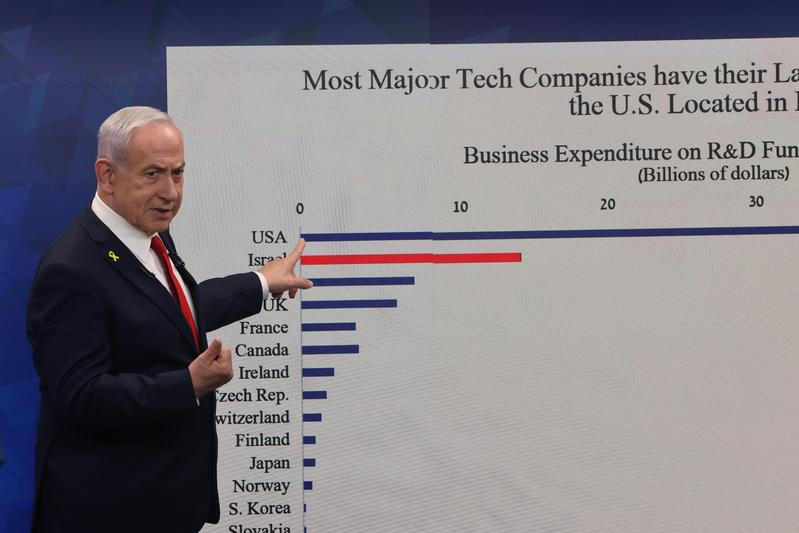Prime Minister Benjamin Netanyahu on Tuesday showcased what he called Israel’s economic resilience after nearly two years of war, pitching global investors while arguing the country must become a “super-Sparta” — technologically superior and strategically self-reliant amid mounting attempts to throttle weapons imports.
“The Israeli economy is very strong… innovative,” he said from his Jerusalem office, pointing to pandemic recovery, wartime stability, and continued inflows to “the technology of the future — cyber, AI and more.” Slides highlighted TASE gains, a steadier shekel, rising GDP per capita, a falling debt-to-GDP ratio, lower unemployment and electricity prices, and Israel’s No. 2 global rank (after the US) for business R&D financed from abroad. Defense exports, he added, hit record levels year after year.
Netanyahu’s pitch: “Get onboard now because we’re about to take off.” He cast the June 12-day confrontation with Iran as proof of Israel’s edge, and outlined an arms-industry expansion designed to prioritize domestic supply at scale and with “unimaginable innovation,” insulating Israel from political constraints in foreign capitals. “First for ourselves,” he said, then for export.

Israeli Prime Minister Benjamin Netanyahu holds a press conferene at the Prime Minister’s office in Jerursalem, September 16, 2025. Photo by Marc Israel Sellem/POOL
The upbeat message landed alongside a sober assessment from the Israel Innovation Authority (IIA). Its annual Status Report on Israeli High-Tech 2025 and a first-ever Deep-Tech Report (with DealRoom) show a sector that is simultaneously breaking records and flashing warning lights. Israel now counts 1,500+ deep-tech firms that have raised $28B since 2019; cumulative private deep-tech valuation tops $177B, up 15× in a decade. Israel leads the world outside the US in deep-tech fundraising and attracts roughly 20% of global cyber investment and about 10% in medical devices and AgriFood.
Yet macro frictions are real: high-tech output has been flat two years at ~17% of GDP; R&D employment fell 6.5% in H1-2025; local VC fundraising is down nearly 80% from its 2022 peak; and new-company formation is roughly half of a decade ago. IIA CEO Dror Bin called it “a moment of truth”: global leadership in deep-tech on one hand, stagnation in jobs, output and entrepreneurship on the other.
The deal tape still signals resilience. 2025 is tracking toward a record year for exits, anchored by Google’s $32B acquisition of Wiz — Israel’s largest ever. Innovation Minister Gila Gamliel framed the momentum against “a war on seven fronts,” arguing for sustained investment in talent, R&D and international partnerships to keep Israel’s edge.
Bottom line: Israel’s economy is carrying the war while the war reshapes the economy. Netanyahu is betting on a larger, more autonomous defense-industrial base and deep-tech expansion to convert wartime urgency into long-term strength. The IIA’s data agree on the destination — leadership — while warning that getting there requires policy urgency at home, not just investor confidence abroad.
Want more news from Israel?
Click Here to sign up for our FREE daily email updates














